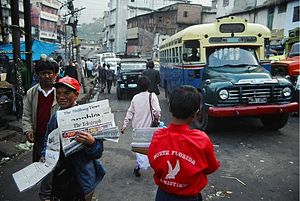One of the most peculiar facets of the northeastern Indian state of Meghalaya has been its unique matrilineal societal structure, which has always been presented as a token for the state being more progressive than the rest of the country. A recent conversation with a senior social worker who is associated with a local NGO has made me look at it afresh, and acknowledge its complexities. There is a clear indication that these traditional customs are under great stress due to financial insecurities in an increasingly economically aspirational state. One of the worst by-products, she says, is toxic masculinity and how it’s such a blind spot in society. To speak on a sensitive topic, she asked not to be identified.
The NGO she is associated with works on women’s issues, especially violence against women. She drew my attention to a searing reality: Young men and boys in Meghalaya are growing up angry and misogynist, there are hints of toxic masculinity already. Since the NGO tries to create awareness among men as well regarding domestic violence, they often go to boys schools. It is here she found young men becoming deeply resentful of the traditional structure in a way one cannot imagine.
The first thing that comes up when there is a discussion about domestic violence is that boys will say: But what about the discrimination we face? There is growing discontent among adolescent boys in the area that they are always taunted by their mothers, sisters, or other female relatives that they will have to leave home once they grow up. If the same toxic message is often repeated, what effect do we expect on a growing up child? It naturally causes trauma and insecurity.
She said it is leading to not just permanent discontent within families, but that the boys also start acting out. There is a tit-for-tat mentality where they would dare the families, especially their sisters, or get into frequent fights. With newly found strength and bursting hormones and nobody to guide them, the toxicity is ruining homes and these young men.
She reported that issues in girls’ schools are very different: They are getting sexually active very early in life and leading a very risky lifestyle. But otherwise it is peaceful and nobody really cares about others. However, in the boys schools, there is intense and serious bullying. Young hormonal boys with no guidance or healthy relationships are taking out their frustrations on others.
Shillong is a stylish city, with kids extremely careful about their looks. The K-pop scene is huge there and so is the obsession with “cool” clothes and shoes. Everything blingy and Western is cool and there is genuine peer pressure to be “with it.” There is always a fear in boys about how they will adjust and cope if they are to be thrown out of home. The fear of abandonment is always there.
The women don’t have it easy either. Once they marry a guy who is already dealing with a lot of issues, the guy finds he has no major role to play even in his wife’s house. The decision making power lies with the wife and her maternal uncle. Even a small trigger can lead to violence and it does. The women tend not to report abuse and violence because of shame.
The NGO worker who spoke to me explains that the youngest daughter in this region not only just inherits property; she is the custodian of the house. She has to take care of her whole family and its reputation so there is always hesitation to admit violence. However, from the time the government started to recognize domestic violence as a health issue and not just social issue, and started one-stop centers in government hospitals, women have started to raise cases of violence because they feel the safest there. Doctors and staff are trained to identify cases of domestic abuse and provide initial counselling. It has clearly helped in an increase in the number of cases being reported in the villages.
But the reporting in cities like Shillong is far lower than in the villages. The NGO worker explains that it is because Shillong is a small place, where everybody knows everybody. The woman wouldn’t bring disrepute to the family she is supposedly the custodian of. It’s apparent that families in Shillong would benefit from a broader sensitization of their youth to these issues.

































